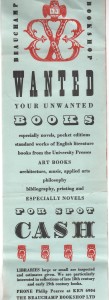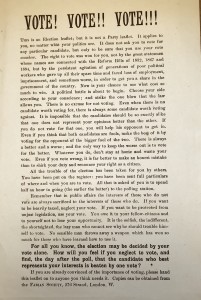Found, among some papers at Jot HQ is this very long and thin flier for The  Beauchamp Bookshop of 15a Harrington Road, which was once located by South Kensington station in SW London. Its most striking quality is the boldness of the two colours ( red and black) used for the various period typefaces on display. To someone who grew up in the Swinging Sixties, when designers took inspiration from Victorian (and even older) typefaces and decorative flourishes, it could date from that time. However, the telephone number featured (KEN 6904) might quite equally suggest a slightly earlier date, though the fact that the all-number system began in London in 1966 doesn’t help us much. Some specialist magazines devoted to design, such as Signatureand the Penrose Magazine, were experimenting with typefaces in the forties and fifties. Indeed, the fact that the Beauchamp Bookshop wished to buy books on bibliography and printing suggests that the owner, Mr Philip Pearce, had an active interest in book design. It is telling too that his special need to acquire ‘ late 18thand early 19thcentury books ‘ betrayed a fondness for well printed and well designed books from this pioneering era of fine printing.
Beauchamp Bookshop of 15a Harrington Road, which was once located by South Kensington station in SW London. Its most striking quality is the boldness of the two colours ( red and black) used for the various period typefaces on display. To someone who grew up in the Swinging Sixties, when designers took inspiration from Victorian (and even older) typefaces and decorative flourishes, it could date from that time. However, the telephone number featured (KEN 6904) might quite equally suggest a slightly earlier date, though the fact that the all-number system began in London in 1966 doesn’t help us much. Some specialist magazines devoted to design, such as Signatureand the Penrose Magazine, were experimenting with typefaces in the forties and fifties. Indeed, the fact that the Beauchamp Bookshop wished to buy books on bibliography and printing suggests that the owner, Mr Philip Pearce, had an active interest in book design. It is telling too that his special need to acquire ‘ late 18thand early 19thcentury books ‘ betrayed a fondness for well printed and well designed books from this pioneering era of fine printing.
As to the bookshop owner, we at Jot 101 must confess an ignorance of Mr Philip Pearce and his shop. South Kensington has always been a haven for book collectors of large and small purses, but the Beauchamp Bookshop has long gone. Nor does the Net record anything about it or its owner, who seems not to have made a mark on the world outside of selling books. We at Jot HQ have asked a leading rare bookseller in the district, but he cannot remember Mr Pearce. Perhaps some collectors in the Jottosphere might recall bookshop and/or owner. If they do, we’d like to hear from them. [RR]


